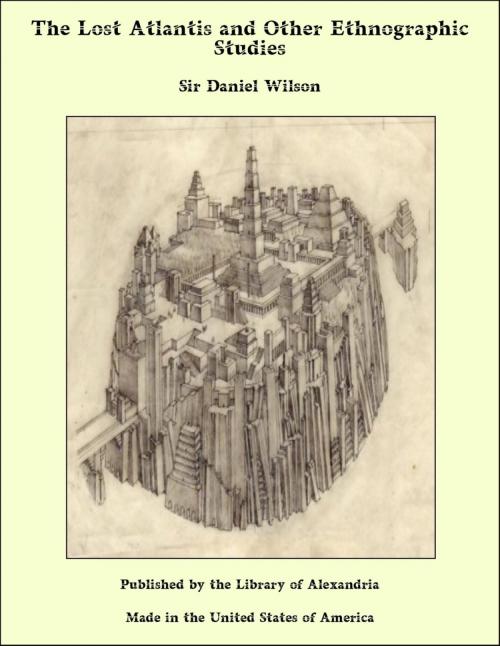The Lost Atlantis and Other Ethnographic Studies
Nonfiction, Religion & Spirituality, New Age, History, Fiction & Literature| Author: | Sir Daniel Wilson | ISBN: | 9781465608123 |
| Publisher: | Library of Alexandria | Publication: | March 8, 2015 |
| Imprint: | Language: | English |
| Author: | Sir Daniel Wilson |
| ISBN: | 9781465608123 |
| Publisher: | Library of Alexandria |
| Publication: | March 8, 2015 |
| Imprint: | |
| Language: | English |
The legend of Atlantis, an island-continent lying in the Atlantic Ocean over against the Pillars of Hercules, which, after being long the seat of a powerful empire, was engulfed in the sea, has been made the basis of many extravagant speculations; and anew awakens keenest interest with the revolving centuries. The 12th of October 1892 has been proclaimed a World’s holiday, to celebrate its accomplished cycle of four centuries since Columbus set foot on the shores of the West. The voyage has been characterised as the most memorable in the annals of our race; and the century thus completed is richer than all before it in the transformations that the birth of time has disclosed since the wedding of the New World to the Old. The story of the Lost Atlantis is recorded in the Timæus and, with many fanciful amplifications, in the Critias of Plato. According to the dialogues, as reproduced there, Critias repeats to Socrates a story told him by his grandfather, then an old man of ninety, when he himself was not more than ten years of age. According to this narrative, Solon visited the city of Sais, at the head of the Egyptian delta, and there learned from the priests of the ancient empire of Atlantis, and of its overthrow by a convulsion of nature. “No one,” says Professor Jowett, in his critical edition of The Dialogues of Plato, “knew better than Plato how to invent ‘a noble lie’ ”; and he, unhesitatingly, pronounces the whole narrative a fabrication. “The world, like a child, has readily, and for the most part, unhesitatingly accepted the tale of the Island of Atlantis.” To the critical editor, this reception furnishes only an illustration of popular credulity, showing how the chance word of a poet or philosopher may give rise to endless historical or religious speculation. In the Critias, the legendary tale is unquestionably expanded into details of no possible historical significance or genuine antiquity. But it is not without reason, that men like Humboldt have recognised in the original legend the possible vestige of a widely-spread tradition of earliest times. In this respect, at any rate, I purpose here to review it. It is to be noted that even in the time of Socrates, and indeed of the elder Critias, this Atlantis was referred to as the vague and inconsistent tradition of a remote past; though not more inconsistent than much else which the cultured Greeks were accustomed to receive. Mr. Hyde Clarke, in an “Examination of the Legend,” printed in the Transactions of the Royal Historical Society, arrives at the conclusion that Atlantis was the name of the king rather than of the dominion. But king and kingdom have ever been liable to be referred to under a common designation. According to the account in theTimæus, Atlantis was a continent lying over against the Pillars of Hercules, greater in extent than Libya and Asia combined; the highway to other islands and to a great ocean, of which the Mediterranean Sea was a mere harbour. But in the vagueness of all geographical knowledge in the days of Socrates and of Plato, this Atlantic domain is confused with some Iberian or western African power, which is stated to have been arrayed against Egypt, Hellas, and all the countries bordering on the Mediterranean Sea. The knowledge even of the western Mediterranean was then very imperfect; and, to the ancient Greek, the West was a region of vague mystery which sufficed for the localisation of all his fondest imaginings. There, on the far horizon, Homer pictured the Elysian plain, where, under a serene sky, the favourites of Zeus enjoyed eternal felicity; Hesiod assigned the abode of departed heroes to the Happy Isles beyond the western waters that engirdled Europe; and Seneca foretold that that mysterious ocean wouldyet disclose an unknown world which it then kept concealed. To the ancients, Elysium ever lay beyond the setting sun; and the Hesperia of the Greeks, as their geographical knowledge increased, continued to recede before them into the unexplored west.
The legend of Atlantis, an island-continent lying in the Atlantic Ocean over against the Pillars of Hercules, which, after being long the seat of a powerful empire, was engulfed in the sea, has been made the basis of many extravagant speculations; and anew awakens keenest interest with the revolving centuries. The 12th of October 1892 has been proclaimed a World’s holiday, to celebrate its accomplished cycle of four centuries since Columbus set foot on the shores of the West. The voyage has been characterised as the most memorable in the annals of our race; and the century thus completed is richer than all before it in the transformations that the birth of time has disclosed since the wedding of the New World to the Old. The story of the Lost Atlantis is recorded in the Timæus and, with many fanciful amplifications, in the Critias of Plato. According to the dialogues, as reproduced there, Critias repeats to Socrates a story told him by his grandfather, then an old man of ninety, when he himself was not more than ten years of age. According to this narrative, Solon visited the city of Sais, at the head of the Egyptian delta, and there learned from the priests of the ancient empire of Atlantis, and of its overthrow by a convulsion of nature. “No one,” says Professor Jowett, in his critical edition of The Dialogues of Plato, “knew better than Plato how to invent ‘a noble lie’ ”; and he, unhesitatingly, pronounces the whole narrative a fabrication. “The world, like a child, has readily, and for the most part, unhesitatingly accepted the tale of the Island of Atlantis.” To the critical editor, this reception furnishes only an illustration of popular credulity, showing how the chance word of a poet or philosopher may give rise to endless historical or religious speculation. In the Critias, the legendary tale is unquestionably expanded into details of no possible historical significance or genuine antiquity. But it is not without reason, that men like Humboldt have recognised in the original legend the possible vestige of a widely-spread tradition of earliest times. In this respect, at any rate, I purpose here to review it. It is to be noted that even in the time of Socrates, and indeed of the elder Critias, this Atlantis was referred to as the vague and inconsistent tradition of a remote past; though not more inconsistent than much else which the cultured Greeks were accustomed to receive. Mr. Hyde Clarke, in an “Examination of the Legend,” printed in the Transactions of the Royal Historical Society, arrives at the conclusion that Atlantis was the name of the king rather than of the dominion. But king and kingdom have ever been liable to be referred to under a common designation. According to the account in theTimæus, Atlantis was a continent lying over against the Pillars of Hercules, greater in extent than Libya and Asia combined; the highway to other islands and to a great ocean, of which the Mediterranean Sea was a mere harbour. But in the vagueness of all geographical knowledge in the days of Socrates and of Plato, this Atlantic domain is confused with some Iberian or western African power, which is stated to have been arrayed against Egypt, Hellas, and all the countries bordering on the Mediterranean Sea. The knowledge even of the western Mediterranean was then very imperfect; and, to the ancient Greek, the West was a region of vague mystery which sufficed for the localisation of all his fondest imaginings. There, on the far horizon, Homer pictured the Elysian plain, where, under a serene sky, the favourites of Zeus enjoyed eternal felicity; Hesiod assigned the abode of departed heroes to the Happy Isles beyond the western waters that engirdled Europe; and Seneca foretold that that mysterious ocean wouldyet disclose an unknown world which it then kept concealed. To the ancients, Elysium ever lay beyond the setting sun; and the Hesperia of the Greeks, as their geographical knowledge increased, continued to recede before them into the unexplored west.















